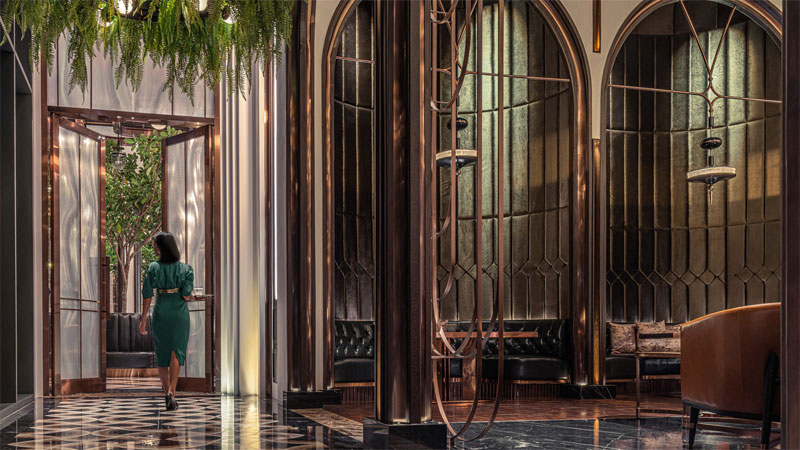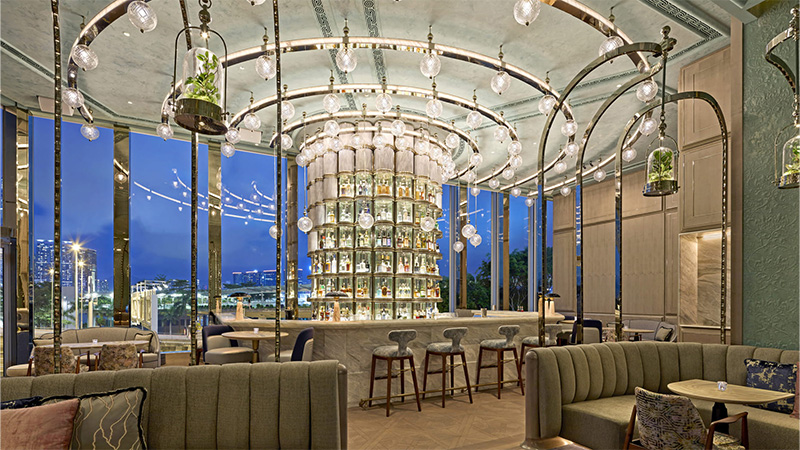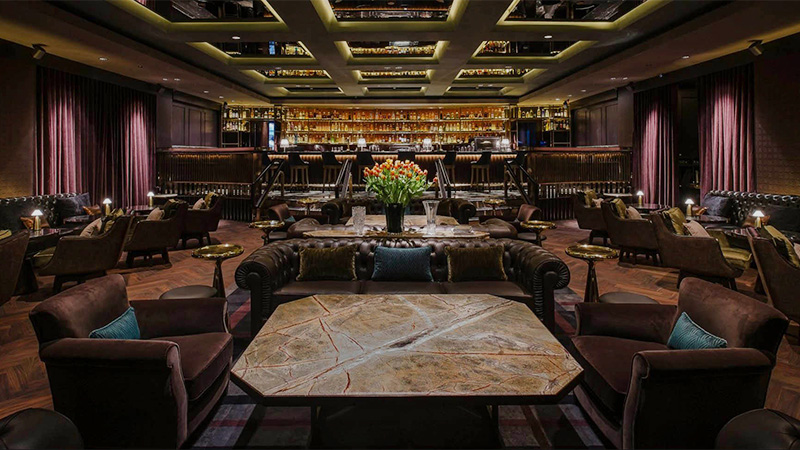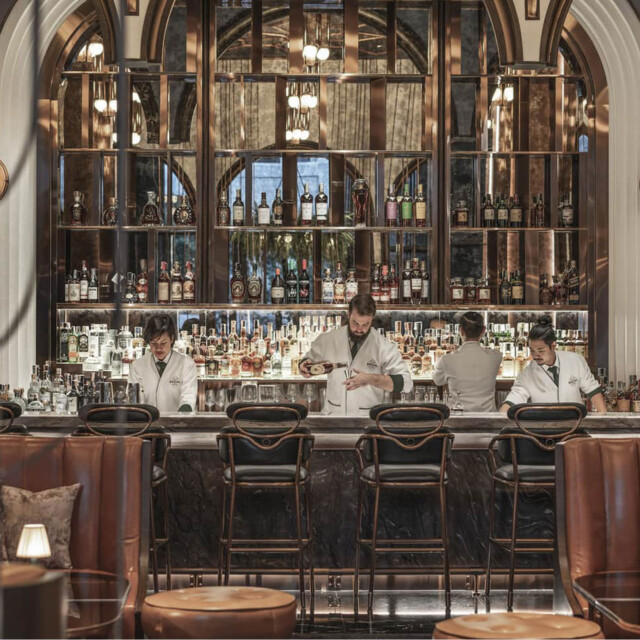When Singapore’s Manhattan pulled off a rare repeat in Asia’s 50 Best Bars list, reaching the No. 1 ranking in 2017 and 2018, it heralded a revolution and helped spur rapid modernization in the world of high-end hotel bars across the continent. In particular, it showed one of the world’s leading luxury hotel groups the power of a modern craft cocktail bar, and what it could bring to its properties: global prestige and tourist traffic, as well as local visitors and revenue. Somehow, some way, it turned Four Seasons into a World’s 50 Best Bars power broker.
“It’s like licking a bit of honey, once you’ve tasted it,” says Philip Bischoff, the beverage manager of the Four Seasons Bangkok at Chao Phraya River, including its signature BKK Social Club bar (No. 10 in Asia; No. 14 in the world), of the success. Bischoff was at Manhattan during its back-to-back reign, and now serves as one of two beverage ambassadors for the Four Seasons hotel brand in the Asia-Pacific (APAC) region, alongside Lorenzo Antinori of Argo in Hong Kong (No. 3 in Asia; No. 28 in the world).
Together, the duo has helped usher in an era of sweeping success for the Four Seasons in Asia’s 50 Best Bars, the regional offshoot within the World’s 50 Best ranking, which has become known as an accepted benchmark for a bar’s global acclaim not only within the industry, but to an increasingly thirsty crowd of international travelers who seek out such hot spots from one city and country to the next. The Four Seasons cohort currently includes Charles H. in Seoul (No. 7 Asia), Bar Trigona in Kuala Lumpur (No. 29 Asia), and Copitas in Bengaluru (No. 44 Asia). That’s three of the top 10 and five total among Asia’s 50 Best Bars, with two making the cut for the World’s 50 Best list. Four Seasons got a taste of the honey, they wanted more, and they set out to get it.
Proof of Concept
Manhattan isn’t even in a Four Seasons hotel. It’s in the Regent Singapore, but the two brands are linked in the convoluted world of hotel conglomerates. Four Seasons owned the Regent brand for several decades, and continued operating a number of its global properties afterward, until IHG purchased a majority share in 2018, the same year Manhattan hit its apex.
“I think Manhattan changed our mindset as a company of what hotel bars can be for us,” Bischoff says. “Then we started working with our restaurant and bar designers and with consultants who help us to kind of really create concepts.”

What Manhattan is, instead, is a bar concept from Proof & Company, the bar consultancy group behind 28 HongKong Street, which won the inaugural Asia’s 50 Best Bars crown in 2016. Proof & Company helped put together the staggeringly beautiful and ambitious Atlas Bar in Singapore and the MO Bar at the Mandarin Oriental Singapore, along with a few others that should already sound familiar: BKK Social Club, Charles H., and Argo.
Longtime Singapore bartender Peter Chua, formerly with Proof & Company and now the co-founder of Night Hawk, recalls the journey well. “Martin Dell [former F&B director at the Regent Singapore, now the GM of the Four Seasons Prague] reached out to Proof & Company to help design and create a new space,” he says. “From that success, the other Four Seasons hotels started taking notice. Right after Manhattan, the Four Seasons in Seoul reached out to Proof & Company to do what we did with Manhattan, and we created Charles H.”
The Four Seasons brand made the push, and Proof & Company was on the ground helping it execute one starry new concept after another. A magic bullet loaded into a golden gun, as it were. “We can’t talk about Four Seasons’ award-winning bars without talking about Proof & Company,” says Hong Kong-based Holly Graham, the author of “Cocktails of Asia” and managing editor of DRiNK Magazine. “They are the brains behind many of the Four Seasons bars, and I think the collaboration between them definitely gave a huge rise to the high-end hotel bar, with Manhattan paving the way.”
From within a hotel group, though, there needs to be a willingness to invest, the vision to see the importance of such ventures, and a dedication to making it work. Four Seasons bought in with full force and put its financial might and muscle behind it. “Our restaurants and bars are the heartbeat of our properties,” says Kimberly Grant, the global head of restaurants and bars at Four Seasons Hotels and Resorts. “We believe having a modern cocktail bar that caters to a local market is an intrinsic part of the Four Seasons brand.”
An Innate if Underused Advantage
Big, luxury hotels have big, luxury budgets and resources. From overall bar design to spirits selection and employee salaries, hotels have a head start on the competition, should they choose to wield it. “As a prior small business owners’ point of view, there is definitely an ‘unfair’ advantage of sorts,” says Victoria Chow, a spirits educator, consultant and founder of Sip Straight, and formerly a Hong Kong bar world entrepreneur. “Luxury hotel bars care much less about the bottom line. They are there to be an amenity to the guests of the hotel, and also locals now as an attraction, and not as a profit puppy.”
To put it another way: If you can foot a New York Yankees payroll, why pretend to be the Miami Marlins? “I think big budgets are the most important aspect in these bars,” Graham says. “It means staff, design, and the back bar are of a certain caliber.”

Then there are all of the additional career opportunities and perks that come with working for a high-profile, global brand. “Working with big hotel brands presents opportunities like internal promotion and the ability to work overseas under the same hotel group” Chua says.
There are built-in HR systems, PR outreach, support for work visas, networking, internal standards for best practices and hospitality. It’s not sexy, but it gets the job done, and it’s part of the ammunition that hotels can use to attract, develop, and retain the right talent. “We’re very, very fortunate with the people that Four Seasons attracts,” Bischoff says.
“In Asia in particular, our teams have been focused on maintaining a creative, agile mindset that helps us to attract the best bar talent in the world,” Grant says. “Our people have always been our key differentiator.” Once the right people are aboard, a global brand also allows for global career trajectories, and within the Four Seasons bar community, it’s common to see bartenders move between properties while advancing up the ladder along the way.
That doesn’t mean that hotels have suddenly become the perfect place for great bartenders to run great bars. There are drawbacks, mainly in the form of stodgy corporate culture and red tape. “Depending on the hotel brand and management, there can come a lot of corporate BS, where concepts and ideas take ages to approve and changes take a long time to implement,” Chow adds.
Chua recalls a specific example of a cumbersome aesthetic cage door over a back bar that needed to be unlocked whenever it was used. “If this had been an independent bar, I would’ve just used a screwdriver to remove it myself,” he says. “However, it took meetings after meetings to get it approved, and it was only removed after four years!”
Still, the advantages of working with an international hotel group, and the benefits — literal and figurative — are too good for many to ignore. “Hotels can provide a sense of job stability and benefits that independently run bars cannot guarantee,” Chua says. “Right now, especially after the pandemic, more industry professionals are willing to give up a little bit of work freedom and liberty in exchange.”
Establishing Culture
One of the fundamental ways that Four Seasons has been able to replicate its cocktail bar world success is by following the well-worn blueprint of the beverage industry: the ambassador. “When I moved from Singapore to Bangkok, our vice president [of food and beverage for Four Seasons in APAC] Philipp Blaser created two roles that are called beverage ambassadors, for Lorenzo and myself,” Bischoff says. “We split the region and for our properties, we are both supposed to engage more closely with them in order to see how we can elevate their beverage programs.”

In a way, this brings the idea of a high-powered outside consultancy in-house. “Philip is kind of the godfather of the Asian bar scene, the god of hospitality, a legend,” says Rohan Matmary, head bartender at Bar Trigona, a property under Bischoff’s watch. “It’s important to have people like Philip and Lorenzo by your side. It gives us a very big upper hand.”
From big to small — “They’re available in the group chat,” Matmary says — there’s an extra resource on hand to problem-solve. It sets a standard, it further establishes culture that’s passed down from one bartender and team to the next. In another sense — and I’m so sorry for doing this — it raises the bar.
Now, shooting for the World’s 50 Best Bars list is never the written objective. And at beach resorts, delivering a consistent take on an easy poolside refresher may be more important than innovating in some spectacular way. But when that kind of result does occur, it’s a feather in the cap for everyone involved — the bar team, the in-house ambassadors, the external designers and consultants, and the corporate bigwigs who put the whole thing in motion. It can be addictive, too, once you get that first taste. “Once you lick the honey, you kind of want to have that back on your toast,” Bischoff says.
This story is a part of VP Pro, our free platform and newsletter for drinks industry professionals, covering wine, beer, liquor, and beyond. Sign up for VP Pro now!
